Not On the Same Page?
By Adnan Adil | Newsbeat National | Published 7 years ago
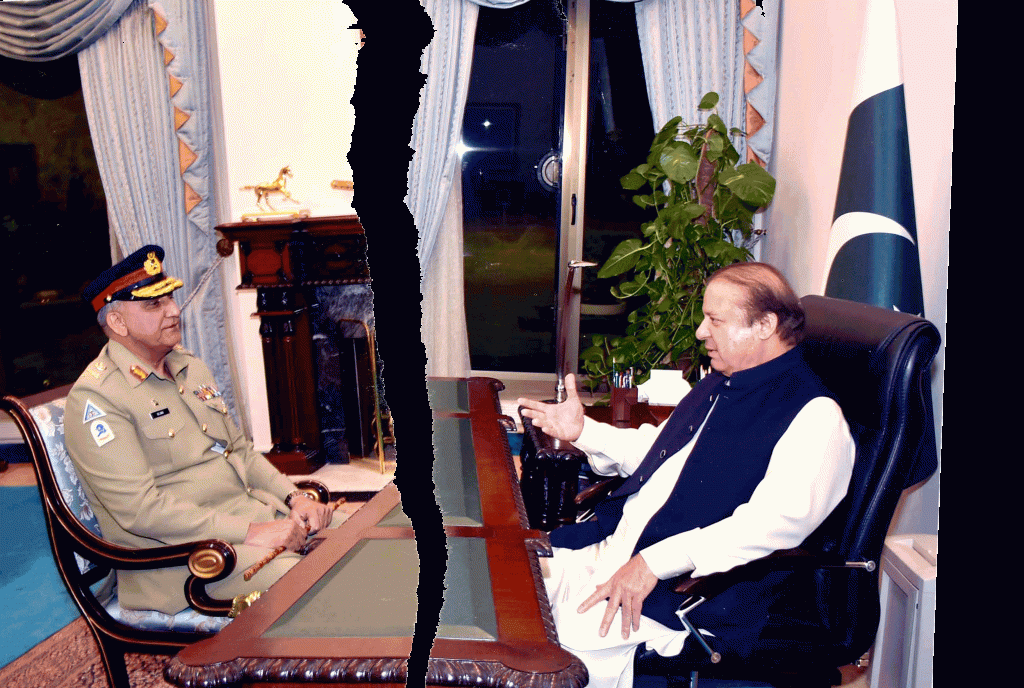
Nawaz Sharif’s propensity for taking on the military establishment has engendered yet another face-off, even though during both his previous tenures, 1990-93 and 1997-1999, he had bitten the dust with similar misadventures. This time, he has fallen foul of an army chief, Gen Qamar Javed Bajwa, who was considered to be very benign towards him.
Hardly had Prime Minister (PM) Nawaz Sharif been granted some respite in the Panama Leaks Case that he triggered tension with the military establishment on the issue of the so-called Dawn Leaks, even though the other side had provided him enough room to wriggle out of what already had the potential to become a crisis.
Published in Dawn in October 6, 2016, the controversial front-page report disclosed the proceedings of a confidential high-level meeting presided over by PM Nawaz Sharif, in which a discussion was held on security issues and foreign relations. The report claimed that in the meeting, Punjab Chief Minister Shahbaz Sharif had complained to the ISI chief, Gen Rizwan Akhtar, that “whenever action has been taken against certain groups by civilian authorities, the security establishment has worked behind the scenes to set the arrested free.”
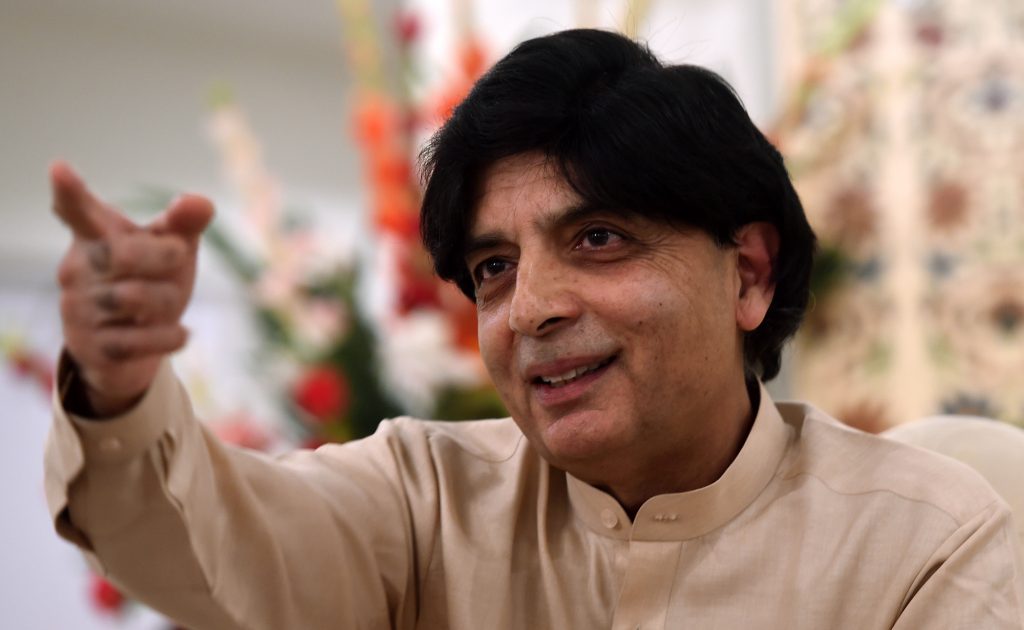
Pakistan’s Interior Minister Chaudhry Nisar Ali Khan gestures
Subsequently, the PM’s office rebutted the report, saying it was untrue. But Dawn refused to back down. Defending its report, the newspaper’s editor, Zaffar Abbas, maintained that “the information was verified, cross-checked and fact-checked,” thereby implying that some high-ups in the Sharif administration had corroborated the information provided to Cyril Almeida, the Dawn writer responsible for the report. Interestingly, the original report did not print either the government’s or the military’s view on the subject — a departure from standard Dawn practice.
It has been argued that the Sharif government deliberately planted the story in the newspaper to bring the army under pressure and to counter its influence in defence and foreign policy issues. Following the protest by the military establishment, the federal government instituted an inquiry committee comprising representatives of both, civilian and military institutions, to probe the matter. This committee, after intriguingly prolonged proceedings of seven months, produced a consensus report with recommendations that were presented to the PM, and approved by him, according to Federal Interior Minister, Chaudhry Nisar Ali Khan.
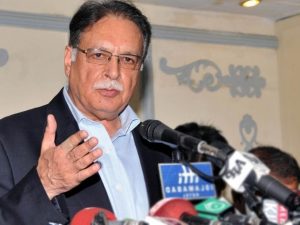
Pervez Rasheed
Earlier, Nisar Ali Khan had told the media that the investigative report had been delayed because members of the committee had differences over the final report. It is widely surmised that the blame for leaking the minutes of this confidential meeting at the PM’s house can squarely be laid at the doorstep of Sharif’s daughter, Maryam Nawaz. While Senator Pervaiz Rashid was quickly made to accept responsibility for the leak, only if the report is made public will it be known whether the investigation committee held Maryam Nawaz responsible or not. Sources disclose that the First Daughter has been spared, but the military leadership was not willing to give such a concession to the other high-ups involved in the affair.
The government had publicly stated that it would accept and implement the inquiry committee’s recommendations. On April 29, Fawad Hasan Fawad, the principal secretary to the Prime Minister, issued a letter to the Interior Ministry directing it to take certain actions. This letter was released to the national media. Among other things, it asked for the removal of Foreign Affairs Adviser, Tariq Fatemi, for his alleged role in the leak, and for the start of disciplinary proceedings against Rao Tehsin Ali, the Principal Information Officer of the Ministry of Information. It also demanded that the All-Pakistan Newspapers Society investigate the conduct of Dawn Editor, Zaffar Abbas, and reporter Cyril Almeida.
The matter did not end there. Rao Tehsin challenged the action against him in court. Tariq Fatemi too, made his displeasure known by the issuance of a letter that has gone viral, rebutting the charge against him. And a couple of hours after the release of the letter from the PM’s Office, the military establishment issued a public rebuke to the government. Director General ISPR, Maj-Gen Asif Ghafoor, who works on behalf of the army chief, tweeted that “the government’s notification on the issue was incomplete and not in line with the recommendations of the investigative committee’s report.” This was not an ordinary tweet — it was one that directly challenged the authority of the PM, implying the army’s no-confidence in the prime minister’s office.
After the military’s open display of displeasure, Nisar Ali Khan addressed a news conference in Karachi, ostensibly in a bid to do some damage control, but that added to the confusion. Khan said that the directive issued by the PM’s Office was not a notification at all, and that it was actually his constitutional role as the interior minister to issue the notification. He implied he would do so soon and that all the recommendations made by him to the PM would be included in the notification. It almost appeared as if the interior minister was suggesting his ministry was superior to the PM’s office.
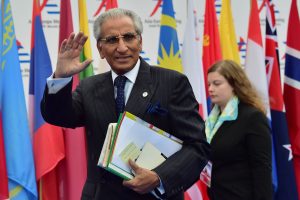
Tariq Fatemi,
There is a growing consensus that the government completely messed up its handling of the Dawn Leaks issue by miscalculating the expected response from the military leadership. It is believed that the Sharif government thought COAS Bajwa would not react strongly to the government’s diluted action against those it had made accountable for the leaks, rather than the person held responsible in the investigative report — at least in public. But they were given a rude shock when Gen Bajwa took a tough position.
The army chief could have privately contacted the prime minister to convey the military’s reservations, but he chose to publicly air his differences with the PM on this issue. This is significant: it demonstrates how sensitive and important the issue of Dawn Leaks has become for the top military brass. This, reportedly, because of the tremendous pressure that has been exerted on them by subordinate officers and soldiers.
Thousands of armed forces personnel have lost their lives fighting terrorism, and the army’s rank and file is in no mood to take any blame from the civilian leadership for ‘abetting terrorism’ as was implied in the Dawn report. The military establishment allegedly sees the story as an attempt by certain quarters to malign the institution for hidden agendas, possibly in connivance with hostile foreign powers.
The ongoing controversy has patently demonstrated how different organs of the state are not on the same page, and that there are serious differences between the civilian government and the military.
The tension between the army and the PM could be viewed as a product of the cumulative effect of many issues. Although Gen Bajwa seems to have been very lenient towards the Sharif-led establishment in the recent past, the military establishment seems to be growing increasingly sceptical about Nawaz Sharif’s intentions and policies on security issues, particularly vis-a-vis India.
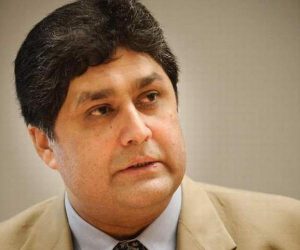
Fawad Hasan Fawad
Indian spy, Kulbhushan Jadhav, was apprehended by Pakistani intelligence agencies, but the Sharif government intriguingly remained detached from the incident, with the PM keeping quiet on the issue. Then, the Dawn Leaks issue came to the fore, which was interpreted in some quarters as the Sharif government’s effort to project the Pakistani army as a rogue force and hold it responsible for terrorism. They cite the campaign run by Nawaz Sharif in 1999 following the Kargil war as another example of his hostility towards the military.
And at a time when Nawaz Sharif was already being viewed with suspicion for being soft towards India, despite the belligerence of his counterpart, Narendra Modi, came the ill-timed visit to Pakistan of Sajjan Jindal, an Indian steel tycoon and a close friend — and alleged business partner — of Nawaz Sharif, as the personal guest of the PM. Sharif had met Jindal when he had visited Delhi at the oath-taking ceremony of Narendra Modi as Prime Minister, but this ‘private’ meeting between the two steel magnates in Murree, raised serious suspicions about Sharif, particularly because Jindal had echoed the Dawn Leaks report in his tweets earlier, and criticised the Pakistan army on the issue of terrorism.
Just one day after the Dawn Leaks controversy erupted this time round, army chief Gen Bajwa clearly conveyed extreme displeasure over Nawaz Sharif’s India policy, by visiting the Line of Control where he strongly expressed Pakistan’s support for the Kashmiri people’s struggle for the right to self-determination and praised them for braving ‘state-sponsored terrorism’ perpetrated by Indian forces in Occupied Kashmir. This was a clear message not only to India, but also to Nawaz Sharif, that the military establishment would not make any allowance when it comes to Kashmir and India.
What has made matters worse for Sharif is the fact that he stands morally tarnished and politically isolated following the SC’s judgment on the Panama Leaks case. All major opposition parties, including the Pakistan People’s Party, the Pakistan Tehreek-e-Insaf and the Jamaat-e-Islami, are arrayed against him and demanding his resignation following the SC’s judgement on the case.

Rao Tehsin
In the current circumstances, there are slim to no chances that Sharif will take a defiant position and demand the resignation of the army chief, Gen Bajwa, as he had demanded from Gen Karamat in 1998, on the much more innocuous issue of suggesting the formation of a National Security Council. Signs are that now the increasingly beleaguered Sharif will seek a compromise with the military leadership. This involves retracting the notification issued by the government, and the issuance of another, incorporating the army’s viewpoint. However, doing this would considerably weaken him, while enhancing the stature of the army chief who, by taking a tough stance on the Dawn Leaks, already appears to have redeemed himself in the eyes of his colleagues and the military’s rank and file.
Even if Sharif manages to dispel the current tension over the Dawn Leaks issue, the chances of him having a good relationship with the military establishment during the rest of his tenure — ie until next year’s general elections — are slim. The deep state appears to be convinced that time and time again, Nawaz Sharif tries to malign the army and conspire against it; hence he cannot be trusted in the days to come.
Since this story was filed, ISPR has retracted the tweet rejecting the government notification on Dawn Leaks. Following a meeting between the prime minister and the COAS, it was announced that the government’s notification regarding the Dawn Leaks issue would be upheld and that the entire matter has been resolved amicably.


